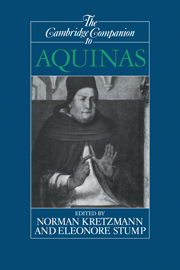Book contents
- Frontmatter
- Introduction
- 1 Aquinas's philosophy in its historical setting
- 2 Aristotle and Aquinas
- 3 Aquinas and Islamic and Jewish thinkers
- 4 Metaphysics
- 5 Philosophy of mind
- 6 Theory of knowledge
- 7 Ethics
- 8 Law and politics
- 9 Theology and philosophy
- 10 Biblical commentary and philosophy
- Bibliography
- References to Aquinas's Works
- Index
4 - Metaphysics
Published online by Cambridge University Press: 28 May 2006
- Frontmatter
- Introduction
- 1 Aquinas's philosophy in its historical setting
- 2 Aristotle and Aquinas
- 3 Aquinas and Islamic and Jewish thinkers
- 4 Metaphysics
- 5 Philosophy of mind
- 6 Theory of knowledge
- 7 Ethics
- 8 Law and politics
- 9 Theology and philosophy
- 10 Biblical commentary and philosophy
- Bibliography
- References to Aquinas's Works
- Index
Summary
For Aquinas metaphysics, first philosophy, and a philosophical science of the divine (scientia divina) are one and the same. Following Aristotle, he is convinced that there is a science that studies being as being. Like other theoretical sciences, metaphysics must have a given subject. According to Aquinas this subject is being in general [ens commune) or being as being. Aquinas describes this science in that way in order to distinguish it from the less extended and more restricted subjects of the other theoretical sciences - natural philosophy (which studies being as subject to change and motion) and mathematics (which studies being as quantified).
By emphasizing that the subject of metaphysics is being as being, Aquinas also establishes his position on an earlier controversy concerning the relationship between the science of being as being described by Aristotle in Metaphysics IV 1-2 and the “first philosophy” or “divine science” developed in Metaphysics VI 1. While the first approach emphasizes the nonparticularity of the subject matter of this science, the second seems rather to focus its study on one particular kind or range of being: separate and immaterial entity, or the divine. If Aristotle clearly attempted to identify these two as one and the same science at the end of Metaphysics VI1, not all interpreters believe that he succeeded.
- Type
- Chapter
- Information
- The Cambridge Companion to Aquinas , pp. 85 - 127Publisher: Cambridge University PressPrint publication year: 1993
- 2
- Cited by



